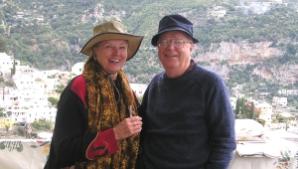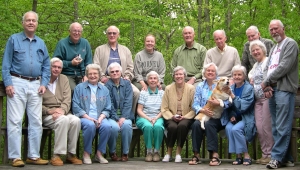About Us Menu
Are You a Disciple for Life?

What does it look like to experience God’s faithfulness and to love his purposes in the world in real time, over the long haul?
Though alumnus Neal Jordan would point to the lives of others as models—to classmates of his in the fifties who went on to serve in Africa or work with children in Appalachia or do lay ministry for international students—his own story offers a compelling picture of God’s faithful care and direction for his disciples over a lifetime. (Watch the video of Neal sharing at InterVarsity’s 2014 National Staff Conference below.)
The College Years: Growing in Mind and Heart
A college freshman at Cornell in 1950, Neal was hopeful. “Times were good,” he said. “After the deprivations of the Depression and of World War II, the focus was on the material. College men were optimistic that they could find good jobs.”
A love for physics in high school led him to opt for the five-year Engineering Physics program at Cornell, a choice he never regretted. The top-notch academics there widened his outlook and helped him understand the world intellectually.
And yet, Neal didn’t want to just grow academically at college; he also knew he needed to grow spiritually. In the early fifties, he noted, “the majority of students, if asked, would probably have said they were Christian—while still expressing some doubt about anyone who did not believe that ‘all roads lead to the top of the mountain.’” The University, however, for all its merits, did little to nurture or refine students’ faith. “But InterVarsity did,” he said.
Neal first heard about InterVarsity the summer before he entered Cornell, while he was working in the kitchen at a church camp. “One morning I looked out into the dimly lit dining room in response to the words ‘I hear you are going to Cornell’ to see a red-and-black-plaid wool shirt, a pair of gold-rim glasses, and a luminous smile coming toward the kitchen,” he recalled. It was Irv Hoffman, a passionate student who served as president of Cornell’s InterVarsity chapter and then went on, along with his wife, to work as a longtime missionary to Muslims. He was the first of many InterVarsity students at Cornell whose lives would continue to inspire Neal long after their college years.
An InterVarsity-student-led, half-semester course on apologetics, speakers who discussed the intellectual challenges of life in the university world, dorm Bible studies, and campus-wide lectures also helped expand Neal’s faith in ways that would shape him for the rest of his life, from finances to family life. For example, his staff worker, Dorothy Farmer, urged him to “pre-commit to Christian choices”—to decide ahead of time, while he could still be objective, how he would use his financial resources for God’s glory. “Early on this meant support of my local church,” Neal said. “Later in life I was able to pre-divert a substantial portion of my estate to Christian causes like InterVarsity.”
He exhorts current students and alumni to develop a similar “pre-commitment” for decisions they’re likely to face. “Envision not only ideal outcomes, but also potential problems,” he said. “And in regard to the problems, ask what the Christian choice would be. Resolve, with God’s help, to make such a choice. Then try to remember that resolve in the pressure of the moment.”
Discipleship That Works in the Real World
With a firm academic and spiritual foundation, Neal fulfilled a military commitment and completed a PhD at Purdue. He then took a job at an Esso-affiliated research lab in Tulsa, Oklahoma, expecting to spend his entire career there. A year-and-a-half later, however, the lab was consolidated with the Humble Oil lab (also owned by Esso) in Houston, and 300 employees, including Neal, were moved to Texas. He would stay with Esso/Exxon for the next 32 years.
His faith in Jesus remained an integral part of his life through those years, influencing the way he approached his work and interacted with colleagues. Coworkers noticed his honesty and integrity, and observed that he was willing to befriend employees whom others seemed to avoid. He also intentionally encouraged and cared for coworkers who were experiencing grief. And when the company faced a mandatory 25 percent reduction in staff, he convinced his bosses to implement a plan he’d developed—one that saved the jobs and accumulated benefits for all but one of the 80-plus members of his division.
His eagerness to learn from others and his strong work ethic were also evidence of his relationship with Christ. Now retired, he still looks back with great respect and gratitude for the coworkers he had throughout the years who were happy to train him and teach him what they knew. “At first this was the ‘GI Bill’ generation who had been at work for 15 years before I arrived and who were willing to share their expertise,” he recalled. “Later it was those new employees, who were more current than I in their fields of expertise, without them displaying any hint of condescension.”
The work itself—using his knowledge and skills, facilitating discoveries, and breaking new ground in seismic exploration—also brought him pleasure. “We were constantly working with the most advanced computers that firms such as Cray or IBM could supply,” he said. “We could at one point actually do what just five years earlier we had judged was beyond the capability of any existing or then-foreseeable machine.”
The Friends Who Spur Us On
In the years that have passed since college, Neal is only one out of many from his InterVarsity chapter who have lived out their faith in compelling ways. Classmates of his have had significant ministries and influence all over the world. And, as several from the group have kept in close contact through the years—even gathering together for a retreat in Virginia biennially for the past two decades—their lives have spurred each other on in discipleship and witness.
Indeed, the impact of such long-lasting friendships, rooted in a shared, ongoing commitment to Christ, is incalculable. “Their initial eagerness and the direction of their lives over the intervening, now almost sixty, years have, for me, provided more compelling evidence of the power of the gospel than did even the on-campus intellectual muscle-building,” Neal said.
For the 1,400 InterVarsity staff gathered at the triennial Staff Conference held in St. Louis last month, Neal’s testimony provided much the same inspiration. His life, and the many ways he has sought to follow Jesus over his lifetime, speak significantly about the power of the Spirit’s work in us, and the difference a staff worker and a Christian community on campus can make—not just for four-to-six years, but for more than sixty.